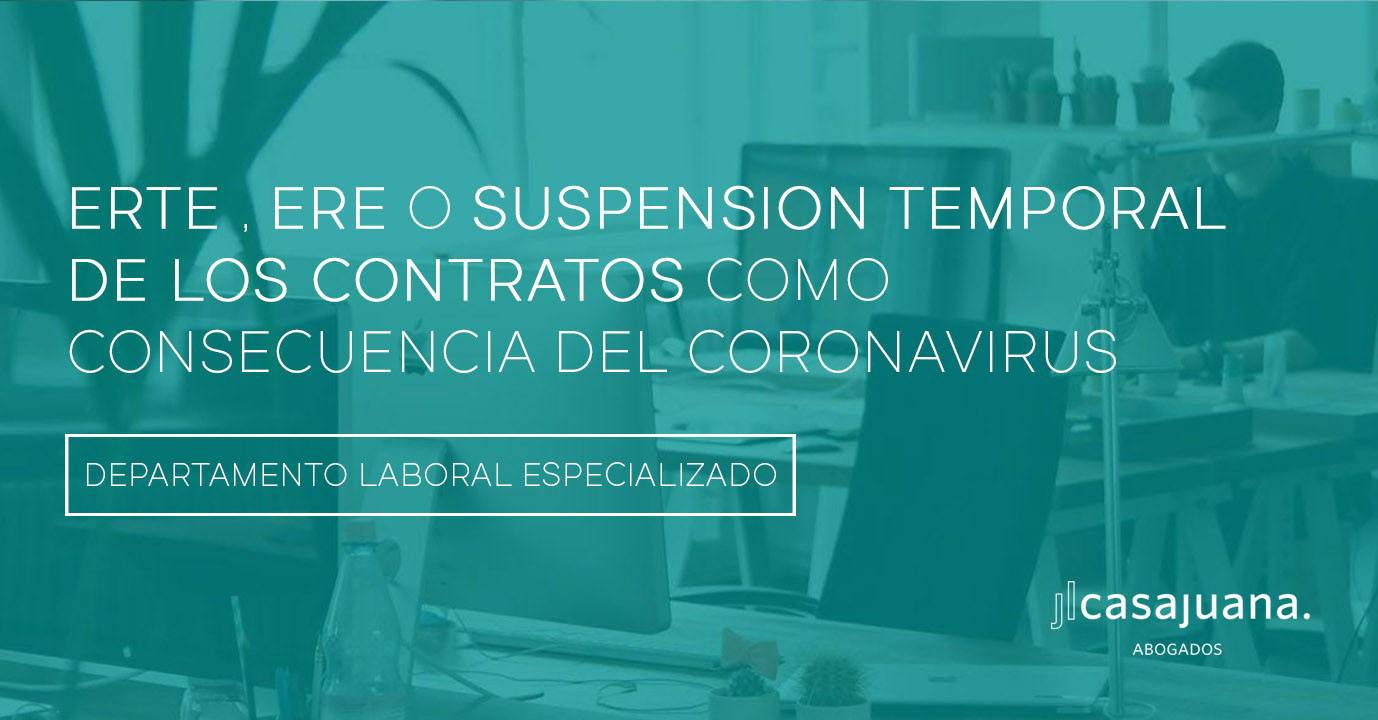What is an ERTE and how does it affect workers?

What is an ERTE due to force majeure?
ERTE is the name given to the temporary employment regulation file that allows companies, among other measures, to suspend employment contracts or reduce working hours , either to all or part of the template.
At any time, provided that the foreseen circumstances occur, the company can initiate a file for the suspension of employment contracts or the reduction of working hours, but given the exceptional circumstances that we are experiencing, for these measures, specialties approved by the RD Law 8/2020, after the declaration of the State of Alarm.
Thus, in the first place, article 47.3 of the Workers’ Statute provides for the cause of FORCE MAJEURE, recognizing and developing the aforementioned RDL the existence of such cause for contract suspensions or reductions in working hours, provided that such measure has its origin in the consequences of COVID-19, including the declaration of the State of alarm, provided that they imply the suspension or cancellation of activities, temporary closure of places of public influx, restrictions on transport public and, in general, the mobility of people and/or goods, lack of supply that seriously impedes continuing with the ordinary development of the activity, or in urgent and extraordinary situations due to contagion of the workforce or the adoption of measures of preventive isolation decreed by the health authority, which are duly accredited.
This greatly simplifies the procedure, which is further expedited by the application of the RDL, which suffices with a letter addressed to the labor authority, prior information to the workers and transfer of the supporting documentation to their legal representatives, if any, who, yes, must validate (the Labor Authority, of course) the cause for the application of the measures adopted.
Obviously, this situation must end when the cause that forced the adoption of the measures also ends.
But the RDL also establishes a specialty for those files, caused by the COVID-19 pandemic, of suspension of contracts and reduction of working hours based on economic, technical, organizational and production to expedite processing. And they consist, in the first place, of the power of the most representative unions to integrate the representative commission of the workers, in the event of the absence of legal representation in the company, although they can continue to designate, failing that, three representatives of the workers, for which the term is reduced to five days.
The period for consultations is also significantly reduced, being established at a maximum of seven days, making the Inspection report optional, which, in any case, must be evacuated within a non-extendable period of seven days.
The worker who is notified of the suspension of his employment contract does not have the obligation to provide his work, nor does the company remunerate it; and the one who is notified of the reduction in the working day, must only provide service on the working day that is established, being paid only that part. And in both cases, the State Public Employment Service pays him the corresponding contributory benefit, either for the full day or for the part that he reduces, as the case may be.

How much does the worker affected by an ERTE due to Coronavirus earn?
As we have stated in the previous point, in case of suspension of work contracts and while it lasts, the employer does not make any payment to the worker, which he will receive from the SEPE, in this In the case of no exceptions, the maximum benefit, which will be 70% of the contribution base during the first six months, with the established limits, which are:
- for workers with two or more children without income under 26 years of age, 1,411.83 euros gross
- for workers with a child without income under 26 years of age, 1,254.96 euros gross
- for workers without children in these circumstances, 1,098.09 euros gross.
And in cases of reduction, the employer will be charged for the part of the workday, and the SEPE, the part of the reduced workday according to the parameters of the previous point.
And as we have warned, in this exceptional case, the unemployment benefit will be applied to the workers affected, even if they do not have the minimum period of quoted employment necessary for it, and also do not the time in which the contributory level unemployment benefit is received is computed, which brings its immediate cause from the aforementioned extraordinary circumstances, for the purpose of understanding that a part of the maximum established periods of perception has been consumed.
On the other hand, the company does NOT continue contributing to Social Security for the affected worker during the period of suspension/reduction in accordance with the following exception that we will try to summarize:
In cases of suspension of contracts and authorized reduction of working hours based on temporary force majeure related to COVID-19, the General Treasury of the Social Security will exonerate the company from paying the business contribution provided for in article 273.2 of the Consolidated Text of the General Social Security Law, approved by Royal Legislative Decree 8/2015, of October 30 (which represents very significant savings for small and medium-sized companies), as well as the one related to the quotas for joint collection concepts, while the period of suspension of contracts or reduction of hours authorized based on said cause lasts when the company, as of February 29, 2020, had less than 50 workers in a situation of unemployment. registration with Social Security.
If the company has 50 workers or more, registered with Social Security, the exemption from the obligation to contribute will reach 75% of the company contribution.
This exemption will have no effect for the worker, maintaining the consideration of said period as effectively contributed for all purposes.
As an additional measure to protect the worker, the sixth additional provision of the RDL establishes that the extraordinary measures in the workplace provided for in it will be subject to the commitment of the company to maintain employment for a period of six months from the date of resumption of activity.
Dismissal of the worker after an ERTE due to force majeure
Obviously, dismissal can be done for some of the reasons provided by law, and if any of the assumptions of objective cause subsists or occurs, the same can be applied to proceed with the extinction of the employment contract.
However, as we have said before, the sixth additional provision of the aforementioned RDL 8/20 establishes, exceptionally, that the application of the aforementioned specialties will be subject to the company’s commitment to maintain employment for a period of six months from the date of resumption of the activity, with which the jobs must be fully maintained during the aforementioned period.
What rights does a worker affected by an ERTE have?
In the face of an ERTE with the specialties established by the RDL, if it is caused by FORCE MAJEURE and this is verified by the Labor Authority, it will be necessary to comply with the measures decided by the company.
If the ERTE is based on any of the objective causes, it can end, within the maximum period established, with or without an agreement, and it can be challenged, resolving the corresponding judicial body , who in case of estimation, will order the employer to restore the plaintiffs to the conditions prior to the application of the measures.
In cases of suspension of work contracts, unlike other measures to modify working conditions, the worker is not empowered to terminate their work contract with a severance pay any.
It may interest you:”ERTE, ERE OR TEMPORARY SUSPENSION OF CONTRACTS as a consequence of the Coronavirus”



















